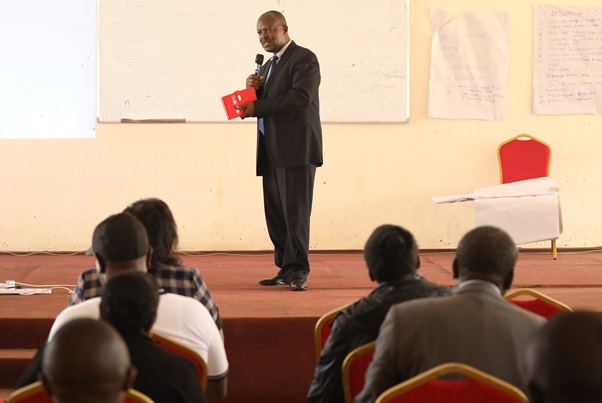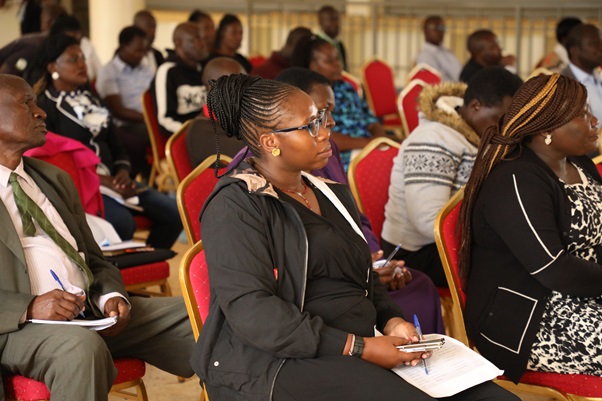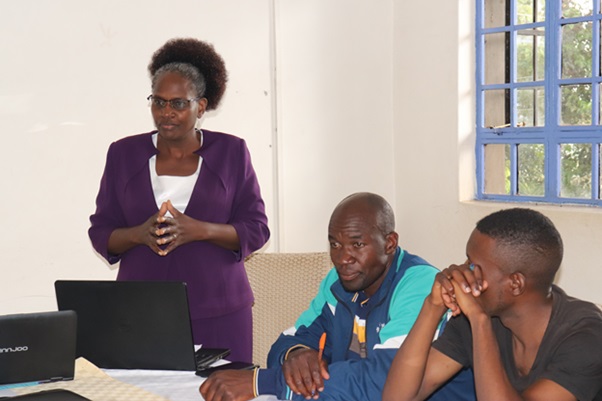In a proactive move towards fostering a supportive workplace culture, MMUST through the Directorate of Aids Control, Gender, and Mainstreaming, on 2 May 2024, conducted a comprehensive Staff Sensitization Workshop on Mental Health. The workshop aimed to raise awareness and equip employees with tools to support their mental well-being at the University. The event took place at MCU and was led by experts in psychology and mental health advocacy, covering a wide range of topics, including recognizing signs of mental distress, destigmatizing mental health conversations, and promoting self-care strategies.
Speaking during the official opening of the workshop, the Registrar of Planning Research and Innovation, Dr. Collins Matemba shed light on the often-overlooked issue of mental health in our fast-paced work culture. He underscored the detrimental effects of excessive social media consumption and the relentless demands of overworking, both of which he highlighted as major catalysts for mental health disorders.

The Registrar Planning Research and Innovation, Dr. Collins Matemba addressing participants during the workshop.
“Excessive use of social media can lead to feelings of isolation and comparison, contributing to mental health issues like anxiety and depression. Overworking on the other hand can also lead to burnout and stress-related disorders, impacting our mental well-being. We must balance these, to maintain good mental health,” said Dr. Matemba. To counteract these impacts, he urged participants to establish limits on social media usage and create designated times for work and relaxation, incorporate self-care practices into their routine, seek support, stay present and mindful in their daily activities, establish work-life balance, and take regular breaks during work to recharge and prevent burnout.
Additionally, he stressed the susceptibility of men to mental health challenges due to their gender, highlighting the influence of factors such as gender norms, societal expectations, and biological differences. Encouraging them to regard their mental health with the same importance as physical health, he advised them to understand that seeking support and prioritizing their mental well-being is not a display of weakness, but rather an expression of resilience and self-nurturing.

A section of participants keenly following the discussions at the event.
The Director Aids Control, Gender and Mainstreaming, Prof. Benedict Alala acknowledged the challenges faced by employees, emphasizing the role of the workshop as an ‘eye-opener’ in raising awareness and fostering resilience regarding mental health among staff members. He underscored the impact of limited resources, such as insufficient funding and the scarcity of psychiatrists in various regions. Prof. Alala pledged to expand similar activities in the future and unveiled plans to delve into research initiatives, aimed at deepening insights into employee welfare and strengthening support mechanisms within the University.
Emphasizing the urgent need for advocacy and support, he encouraged attendees to utilize the resources available at the Directorate to voice their concerns and provide feedback, thereby facilitating ongoing advocacy efforts.

The Director of Aids Control, Gender, and Mainstreaming, Prof. Benedict Alala at a past event.
Similarly, Prof. Elizabeth Omukunda, the Chairperson- Aids Control Unit Committee highlighted mental health as a pressing concern, stressing its pervasive impact in places of work. She emphasized that mental health challenges can profoundly affect productivity through limitations in focus, motivation, and interpersonal dynamics.
“When individuals experience mental health challenges such as stress, anxiety, or depression, their ability to focus and make decisions may be impaired. These conditions often lead to decreased motivation, reduced energy levels, and difficulty in managing tasks efficiently. If it goes untreated, mental health issues also result in absenteeism, presenteeism, and a higher likelihood of making errors or poor judgment calls. Besides these, mental health concerns negatively affect our relationships and communication in the workplace, leading to conflict and tension among colleagues,” she explained. Prof. Omukunda applauded MMUST for proactively addressing the issues of mental health and providing support for employees, to ensure a healthier work environment that is conducive to optimal productivity, job satisfaction, and self-confidence among staff members.

Prof. Elizabeth Omukunda, the Chairperson- Aids Control Unit Committee at a past event.
Notably, Dr. Omukunda highlighted the long-term consequences of untreated mental health issues, stating the alarming rate of untimely deaths attributed to conditions such as depression and substance abuse. She urged the participants to take proactive steps in managing their mental health and emphasized the importance of destigmatizing mental illness as well as promoting open dialogue within the workplace.
The lead trainers, Ms. Zipporah Ombogo and Mr. Ayub Orina guided participants through comprehensive sessions covering topics such as ‘Common Mental Health Disorders’, ‘Psychological First Aid’, ‘Hypertension’, and ‘Diabetes Mellitus’. Ms. Ombogo emphasized the gender disparity in suicide rates, noting that men with mental health problems are more likely to complete suicide compared to women, who tend to make suicide attempts. She urged participants to approach individuals experiencing mental health challenges with empathy and to foster a supportive environment to mitigate additional risks.

One of the lead trainers, Ms. Zipporah Ombogo, making a presentation during the workshop.
The participants engaged in interactive sessions, discussing real-life scenarios and sharing experiences, fostering empathy and understanding. One of the highlights of the workshop was the emphasis on destigmatizing mental health conversations. The staff were encouraged to open up about their own experiences and challenges, creating a safe space for dialogue and support.
It is important to adopt mental health sensitization in society and places of work and this includes warning signs, understanding mental health risks, and being able to provide basic first aid. Cultivating a positive mental health environment in the workplace not only enhances staff productivity but also elevates the overall performance of the institution. It is commendable that MMUST continues to take significant steps toward fostering a workplace culture that prioritizes mental health awareness and support.
By Caren Nekesa and Steven Omondi
Photos by Shiundu Masafu





